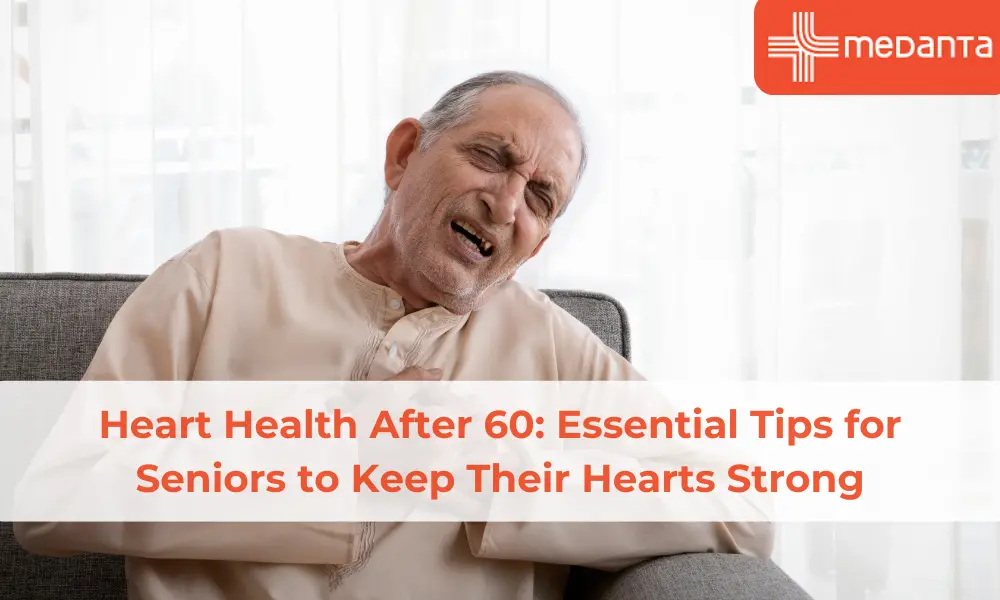Heart Health After 60: Essential Tips for Seniors to Keep Their Hearts Strong

TABLE OF CONTENTS
Heart disease ranks as the leading cause of death for both men and women. The risk rises substantially with age. Heart health becomes a vital concern after 60 since ageing triggers substantial changes in the heart and blood vessels.
The good news is that you can maintain a healthy heart as you age with basic lifestyle adjustments. Your heart disease risk starts dropping just one day after you quit smoking. Regular exercise can substantially lower your chances of heart disease. Most adults need at least seven hours of sleep each night to keep their hearts healthy.
This article reveals the hidden aspects of heart disease prevention that doctors might skip during quick visits. You'll find practical ways to boost your heart health and stay strong past sixty.
Why Heart Care Matters More as We Age
Your heart goes through significant physical changes that make heart care crucial after 60. The risk of cardiovascular events increases dramatically when you reach your 60s. This reality goes beyond just celebrating another birthday—it's about what's happening inside your chest.
Age causes your heart chambers to expand while the walls get thicker. These changes aren't simple adaptations. The thicker walls become rigid and stop your heart chambers from filling with blood properly before each pump. Then many older adults develop diastolic heart failure even when their blood pressure looks normal.
Your ageing heart faces several key challenges:
Your body becomes more sensitive to salt, which raises your blood pressure and risk of heart failure.
Your arteries harden and make you feel dizzy when you stand up quickly.
Your heart muscle contracts more slowly and doesn't relax completely between beats.
You also lose your heart's natural ability to speed up during exercise.
The situation looks worse for women—their heart failure risk triples every decade between 65 and 85 years, while men's risk only doubles.
You can take control of your heart health by understanding these age-related changes and taking action before problems start.
Common Heart Problems in Older Adults
The risk of developing heart conditions increases dramatically as we age. People over 60 face a higher chance of heart problems that affect their daily activities in many ways.
Common heart conditions are:
Hypertension leads the list of heart-related concerns among seniors
Coronary heart disease, plaque buildup in arteries becomes more common each decade
Heart rhythm problems
Heart failure, which affects women more frequently
Valve diseases, with aortic stenosis being the most common
Myocardial infarction (heart attack)
How to Prevent Heart Disease in Older Adults

Your heart's well-being becomes a vital priority as you age. Simple lifestyle changes today can make a huge difference to your heart health after 60.
Nutrition is the centre of heart disease prevention. A heart-healthy diet has plenty of vegetables, fruits, whole grains, beans and low-fat dairy. Your protein should come from lean sources like skinless poultry and omega-3 rich fish such as salmon, mackerel and sardines.
Limit your intake of foods high in saturated fats, added sugars and sodium. Health experts recommend staying under 2,300mg of sodium daily - about one teaspoon of salt.
Physical movement provides powerful protection against heart problems. The best amount of exercise has:
At least 150 minutes of moderate activity (brisk walking) or 75 minutes of vigorous exercise (running) weekly
Strength training sessions twice weekly
Balance-enhancing exercises at least three days weekly for those over 65
Smoking cessation benefits you whatever your age. Stopping smoking has a quick positive effect on heart health. It lowers blood pressure, makes blood flow better, and cuts down on clots forming. As time goes by, it brings down the chance of having a heart attack, stroke, or issues with the arteries around the heart. This helps the heart work better and stay tough.
Keeping your weight in check is significant as your body needs fewer calories with age. Even a small drop in weight around 5-10%, can make your blood pressure and cholesterol better.
Regular medical check-ups monitor your blood pressure, cholesterol & blood sugar levels - these form the core of a healthy heart. Your doctor might prescribe medicines if lifestyle changes alone don't effectively control them.
Healthy Heart Tips for Seniors
Your practical roadmap to a stronger heart after 60 sits right here, hosted for quick reference:
Heart Health Category | Specific Actions |
Diet | • You need 30g fibre daily (men) or 21g daily (women) • Mediterranean diet works best with fish, fruits, vegetables, beans • Smaller plates help control portion sizes • Salmon and other fatty fish twice weekly provide omega-3s |
Exercise | • Weekly moderate activity should reach 150 minutes • Water aerobics offers joint-friendly movement • Muscle strength comes from resistance training • You can split exercise into 10-15 minute sessions |
Daily Habits | • More water helps flush toxins • Quality sleep should last 7+ hours nightly • Quitting smoking brings immediate benefits • Keep alcohol intake minimal |
Medical Care | • Regular checks of BP and cholesterol matter • Your gender affects heart attack warning signs • Your doctor helps manage existing conditions • Daily sodium should stay under 2,300mg |
Stress Management | • Meditation and relaxation techniques help • Mind-body benefits come from yoga or tai chi • Friends or therapists provide valuable support • Support groups offer additional help when needed |
These changes will strengthen your heart, even if you implement just half of them. Simple swaps work best at first - whole grain instead of white bread or a 10-minute walk after dinner. Each small improvement makes your heart stronger.
Medical Care and Regular Heart Check-ups
Your heart health needs regular medical supervision when you reach your sixties.
A typical heart check-up has these key tests:
Blood pressure measurement
Cholesterol screening
Blood glucose test
Body mass index check
A talk about your lifestyle choices
Your doctor may order more tests if they suspect heart disease:
ECG to track your heart's electrical signals
Echocardiogram to check your heart's function and valves
Stress test to see how your heart works during exercise
Chest X-ray to look for an enlarged heart
Cardiovascular diseases kill more older adults than any other cause. Regular screenings can catch hidden problems before they become life-threatening emergencies. This makes proactive medical care your best defence against heart disease.
Conclusion
Your heart just needs attention, especially after age 60. Age naturally changes our cardiovascular system, but these changes shouldn't limit your quality of life. Healthy eating habits are leading preventive measures. Physical activity plays a significant role. Even gentle movement helps your heart stay strong.
By changing your habits, regular medical check-ups and keeping an eye on your blood pressure and cholesterol, you can take charge of your heart health after 60. Better heart health doesn't require perfect adherence to every recommendation. Focus on consistent improvements that fit your lifestyle. Your heart will appreciate every positive choice, whatever time you start. Taking charge of your heart health now will give you more vibrant years ahead.
FAQs
At what age does the risk of a heart attack increase substantially?
Men face higher heart attack risks after 45, while women's risks increase after 55. Your risk goes up because age leads to harder arteries, thicker heart walls, and your body becomes more sensitive to sodium.
How can seniors naturally keep their hearts healthy?
Seniors should focus on these habits beyond diet:
30 minutes of gentle movement daily
Keeping a healthy weight
Regular checks of blood pressure and cholesterol
Quitting smoking—this step alone will give a dramatic boost to heart function
What foods are best for preventing heart disease in older adults?
The Mediterranean-style diet works best with its mix of fruits, vegetables, whole grains, and lean proteins. You should eat fatty fish like salmon, sardines, and mackerel twice weekly because they're rich in omega-3s.
How much exercise is safe for older adults with heart conditions?
You should target 150 minutes of moderate activity each week. People with heart conditions can get custom exercise plans from cardiac rehabilitation experts who understand their limitations.
How often should older adults get their heart checked?
Everyone over 60 needs yearly check-ups. Your doctor might recommend more frequent visits if you have risk factors.
Can stress affect heart health in seniors?
Yes, it definitely can. Long-term stress leads to inflammation, higher blood pressure, and blood vessel damage. The stress hormones cortisol and adrenaline speed up plaque buildup in your arteries.
Are supplements helpful for maintaining heart health in older adults?
Many researchers found that most heart health supplements provide no proven benefits. Fish oil (omega-3) might help people who don't eat enough fatty fish. Some supplements can actually harm you—vitamin E raises stroke risk, too much calcium could worsen cardiovascular disease, and many products have inconsistent ingredients.
How does blood pressure management reduce heart disease risk?
Blood pressure control is crucial to protect your heart. Various studies demonstrated that lowering systolic blood pressure to 110-130 mm Hg in people aged 60-80 led to substantially fewer cardiovascular events compared to higher targets. High blood pressure damages blood vessels directly, makes heart walls thicker, and increases stroke risk. Blood pressure tends to rise as we age, so regular monitoring becomes vital.
Can heart disease be reversed naturally in older adults?
Although a complete reversal isn't always possible, improvements can happen. A plant-based diet full of grains, vegetables, fruits, and legumes helps clear arterial blockages. Exercise makes heart muscles more elastic even in early heart failure cases. Stress reduction methods support heart recovery further.
What are the early warning signs of a heart attack in older adults?
Older adults' symptoms often differ from the dramatic chest-clutching scenes shown in movies. Key signs include:
Chest pressure or tightness instead of sharp pain
Unusual fatigue or weakness
Pain in arms, jaw, neck or back
Shortness of breath
Nausea or indigestion






